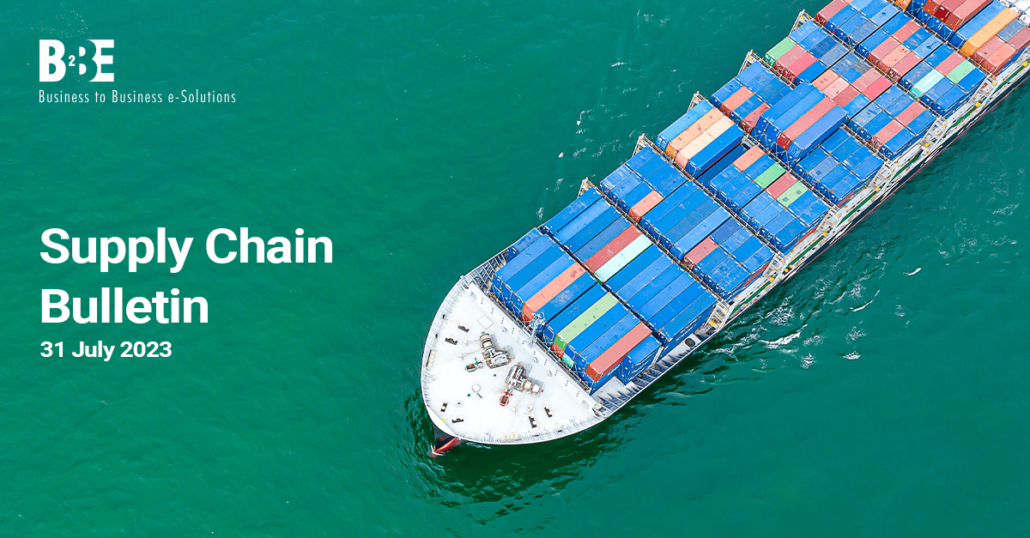This is your weekly supply chain bulletin from B2BE for the week starting 31st July 2023.
Each week, we bring you a rundown of the latest trends in the news from across the supply chain industry. We cover the issues most important to you, bringing you useful links to the full articles. This ranges from news on various supply chain disruptions to strategies to lessen the damage. We also include other relevant supply chain related updates. If you missed it, you can read last week’s supply chain bulletin here. Read on to see what’s making the news this week.
Improving Australia’s supply chain performance
In an interview with MHD, Paul Zalai, Director of Freight & Trade Alliance (FTA) and Secretariat of the Australian Peak Shippers Association (APSA), discusses the need for improving Australia’s supply chain performance. The World Bank’s trading across border ranking for Australia has significantly declined over the past decade, and in response, the federal government has committed $23.8 million in 2023-24 to modernize and enhance the country’s international trade system.
Paul highlights that the challenges go beyond inefficiencies in legacy government systems and regulations. The Productivity Commission’s review of Australia’s Maritime Logistics System has emphasized the urgency for shipping competition and specific landside commercial practices reform. However, the federal government is yet to respond to the commission’s report, despite extensive evidence provided by the FTA that these supply chain practices are directly costing the trade sector $1 billion annually.
The imperfect food movement change to the supply chain
The ugly or imperfect food movement is gaining momentum as entrepreneurs seek to change perceptions of rejected produce in Australia. Millions of tonnes of food are wasted annually, with items like awkward potatoes, conjoined carrots, and hail-blemished oranges often discarded by food retailers. Citrus fruits, for example, can be rejected by major retailers for minor imperfections, leading to substantial waste. To combat this, some entrepreneurs are including imperfect produce in cut-price subscription boxes, offering consumers a more affordable and sustainable option.
Australia produces 7.6 million tonnes of food waste each year, resulting in significant water usage, land utilization, and emissions with no benefit. There is a debate over who is responsible for the desire for perfectly shaped and unblemished produce that leads to such waste. While food retailers claim consumers prefer good-looking produce, some believe retailers have conditioned shoppers over time to prioritize appearance.
The connection between supply chain risk and SatNavs
Risk management expert Adriano Lanzilotto draws a comparison between supply chain risk management and SatNavs using a humorous story of a tourist’s GPS misadventure in Iceland. The mishap highlights the importance of accurate data in both scenarios.
Lanzilotto emphasizes that supply chain risk assessment starts with accurate supply chain mapping, identifying weak links, and potential exposures. He mentions the challenges risk managers, brokers, and insurers face when dealing with inaccurate or incomplete supplier data.
What global companies are falling short in addressing forced labour risks in their supply chain?
The 2023 KnowTheChain Food & Beverage Benchmark report reveals that major food and beverage companies are falling short in addressing forced labour risks within their supply chains. The benchmark ranks the top 60 companies based on their commitment to human rights, governance practices, traceability of raw materials, risk assessment protocols, purchasing practices, and recruitment. On average, the firms scored only 16 out of 100.
Top-ranking companies include Australia’s Woolworths (56/100), UK’s Tesco (52), and US-based JM Smucker Company (47). However, only the top two businesses scored above 50, and half of the assessed companies scored less than 10 out of 100.
About B2BE
B2BE delivers electronic supply chain solutions globally, helping organisations to better manage their supply chain processes, providing greater levels of visibility, auditability and control. We’re driven by a passion for what we do, inspired by innovation, and underpinned by a wealth of knowledge. With over 20+ years of experience, the B2BE teams operate worldwide.
欲了解更多信息,请访问www.b2be.com。
